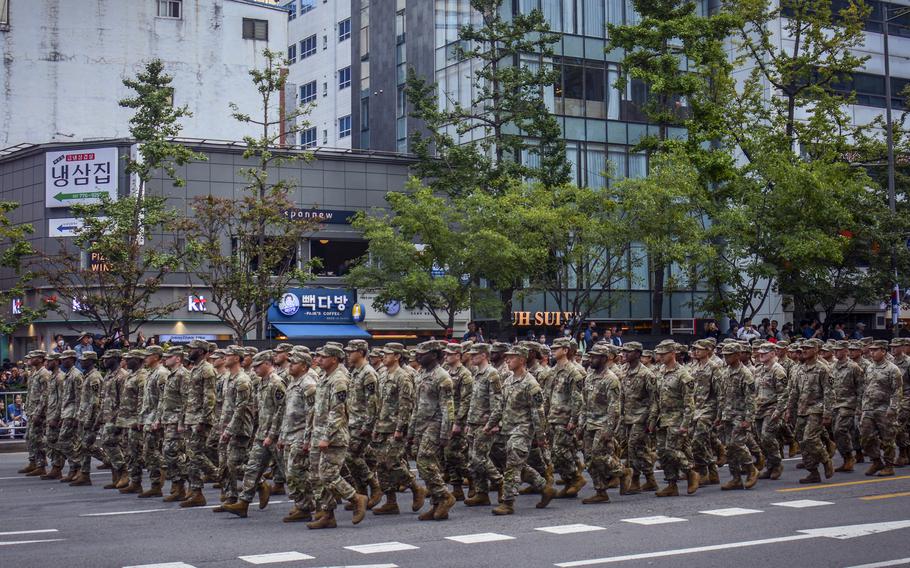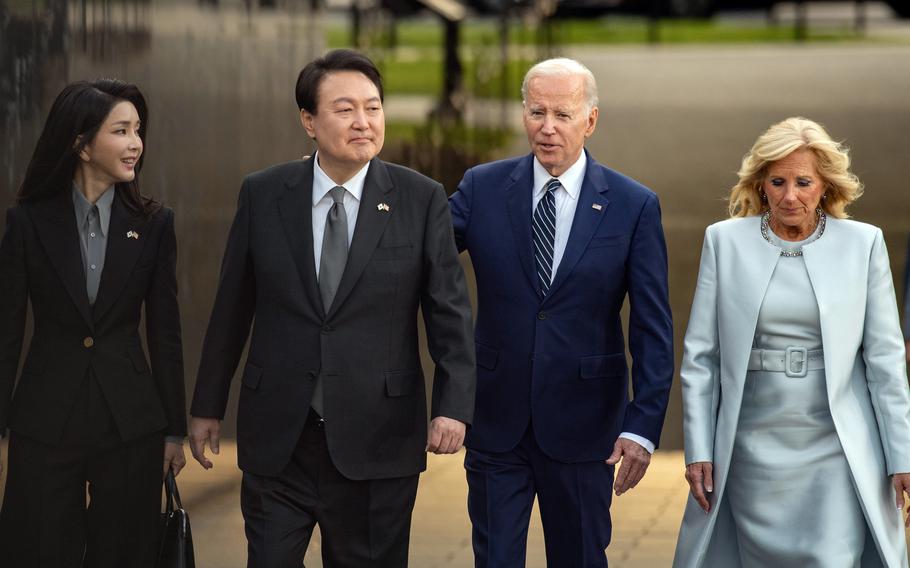
U.S. soldiers march through downtown Seoul during South Korea’s Armed Forces Day parade, on Oct. 1, 2024. (Luis Garcia/Stars and Stripes)
CAMP HUMPHREYS, South Korea — Seoul’s share of the cost for hosting roughly 28,500 U.S. troops will rise annually but at a slower pace than in previous years, according to a proposal signed last week by U.S. and South Korean diplomats.
The Special Measures Agreement sets the cost of maintaining the U.S. military presence on the peninsula over a five-year period. Details of the tentative deal were released Friday by the South’s Ministry of Foreign Affairs after negotiators wrapped up their eighth round of talks in five months.
The current agreement, which expires Dec. 31, 2025, required South Korea to pay $1 billion in 2021 and then raise its annual contribution based proportionally on increases to its defense spending. Seoul increased its defense budget by an average of 4.3% during the current agreement.
Under the 2026-30 proposal, which needs approval from South Korea’s National Assembly and President Yoon Suk Yeol, Seoul will contribute $1.125 billion in the first year, followed by annual hikes proportional to the consumer price index — the average cost of household goods.
Seoul is expected to raise its annual contribution by 2% under the new terms, the Foreign Ministry said. Rate hikes based on South Korea’s consumer price index were also used in agreements between 2009 and 2018.
The new agreement also introduces an 5% cap on South Korea’s annual contribution to “prevent a sharp increase … if an unexpected economic situation occurs,” according to the ministry.

President Joe Biden, first lady Jill Biden, South Korean President Yoon Suk Yeol and first lady of South Korea Kim Keon-hee visit the Korean War Memorial in Washington, D.C., in April 2023. (Henry Villarama/U.S. Army)
The rate and contribution ceilings better reflect the improvement of the U.S.-South Korea alliance while “maintaining the framework of the existing [Special Measures Agreement],” the ministry said.
The moderate increases appear to be “relatively reasonable and acceptable” for South Korea, according to Cha Du Hyeogn, a lead researcher for the Asan Institute for Policy Studies in Seoul.
South Korean government officials are likely to sign off on the new deal, Cha said by phone Tuesday.
The terms also stipulate that South Korean funds will not be used for repairing and maintaining U.S. military assets outside of the Korean Peninsula, according to the ministry release. Cha said this clause shuts the door to Seoul funding a potential U.S. conflict well beyond its borders, but that could be up for debate in future negotiations.
American troops, aircraft and warships based in the U.S. and Japan are frequently used in South Korea for military exercises. In September, members of the 15th Marine Expeditionary Unit from Camp Pendleton, Calif., and the 31st MEU from Okinawa, Japan, participated in the large-scale amphibious assault exercise at Pohang Beach, about 150 miles south of Seoul.
South Korea’s ruling People Power Party endorsed the latest agreement in a statement Friday but said Washington and Seoul must “adhere to its terms regardless of the political situation.”
“Alliances are not the result of a deal but the foundation of trust between the two countries,” the statement said. “Therefore, the agreement should not be shaken by the outcome of the U.S. presidential election, and it should ensure that it does not undermine the value of the alliance.”
During his term as U.S. president, Donald Trump, now the Republican presidential candidate, accused Seoul of not paying its fair share for U.S. military assets in South Korea and claimed the U.S. was spending $5 billion annually to maintain its forces there.
During an interview with Time magazine in April, Trump described South Korea as “a very wealthy country” and that the U.S. “essentially paid for much of their military free of charge.”